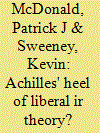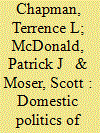|
|
|
Sort Order |
|
|
|
Items / Page
|
|
|
|
|
|
|
| Srl | Item |
| 1 |
ID:
080173


|
|
|
|
|
| Publication |
2007.
|
| Summary/Abstract |
Despite substantial evidence that international trade has promoted peace in the post-World War II era, the commercial peace research program still faces an important historical challenge. Dramatic economic integration in the nineteenth century failed to prevent the increasing interstate hostilities that culminated in the outbreak of war in 1914. This article uses a theoretical revision grounded in standard trade theory to reexamine the relationship between commerce and peace in the fifty years before World War I, a period often referred to as the first era of globalization. The article focuses on domestic conflict over commercial policy rather than on interdependence to understand the conditions under which globalization promotes peace. In a sample dating from 1865 to 1914, the authors find that lower regulatory barriers to commerce reduce participation in militarized interstate disputes. Contradicting conventional wisdom, this evidence affirms a basic premise of commercial liberalism during the first era of globalization-free trade promotes peace
|
|
|
|
|
|
|
|
|
|
|
|
|
|
|
|
| 2 |
ID:
138305


|
|
|
|
|
| Summary/Abstract |
We present a formal model of international bargaining between two states in which one government must negotiate with a domestic opposition faction to secure tax revenue for military spending. The model examines how robust the international order is to domestic political crises that activate a stark trade-off to a governing coalition. Namely, offering fiscal relief to stave off domestic revolution can simultaneously undermine the larger international political order by facilitating military spending that can, under some circumstances, result in sizable shifts in the relative distribution of military power between states. We find that two key domestic conditions influence the likelihood of preventive war: the distribution of income within the state's economy and the relative economic stake that opposition groups possess in international settlements.
|
|
|
|
|
|
|
|
|
|
|
|
|
|
|
|
| 3 |
ID:
140350


|
|
|
|
|
| Summary/Abstract |
This paper blends recent research on hierarchy and democratization to examine the theoretical and empirical costs of treating regime type exogenously in the literature most identified with studying its impact on international politics. It argues that the apparent peace among democratic states that emerges in the aftermath of World War I is not caused by domestic institutional attributes normally associated with democracy. Instead, this peace is an artifact of historically specific great power settlements. These settlements shape subsequent aggregate patterns of military conflict by altering the organizational configuration of the system in three critical ways—by creating new states, by altering hierarchical orders, and by influencing regime type in states. These claims are defended with a series of tests that show first how the statistical relationship between democracy and peace has exhibited substantial variation across great power orders; second, that this statistical relationship breaks down with theoretically motivated research design changes; and third, that great powers foster peace and similar regime types within their hierarchical orders. In short, the relationship between democracy and peace is spurious. The international political order is still built and managed by great powers.
|
|
|
|
|
|
|
|
|
|
|
|
|
|
|
|
| 4 |
ID:
076851


|
|
|
|
|
| Publication |
2007.
|
| Summary/Abstract |
The costs and unmet expectations of the democracy promotion project in Iraq and the wider Middle East have sparked a broad debate about the future of U.S. grand strategy. In the chorus for change, some suggest that the United States should return to such principles of liberal internationalism as multilateralism and financial beneficence, which marked the golden era of U.S. diplomacy in the years immediately following the end of World War II. Others insist that U.S. foreign policy needs to be reestablished in a more pragmatic realism that responds to the global balance of power and resists the overuse of military muscle to promote democracy around the world.
Greater reliance on U.S. economic power can inject more prudence into foreign policy without abandoning the historical U.S. goal of promoting freedom and political reform around the world. The United States possesses the largest and most vibrant market in the global economy and can integrate this unique political asset more effectively in the larger global struggle against terrorism and radical Islam. Unilaterally eliminating trade barriers on imported goods from moderate Islamic states critical to combating terrorism, such as Bangladesh, Ethiopia, Indonesia, Kenya, Malaysia, Mali, Mauritania, Nigeria, Pakistan, the Philippines, Tanzania, and Turkey, could strengthen Washington's capacity to promote political moderation and cultivate local influence within these countries.
As foreign businesses and workers come to depend on U.S. consumers for profits and jobs, they become important allies in internal struggles taking place around the world between the forces of modernization, globalization, and tolerance against those of tradition, introversion, and hatred. Expanded access to the U.S. consumer market cultivates an enduring foundation for common political interests with the United States by creating jobs and economic opportunities in potential havens for terrorist activity while strengthening liberty and domestic political reform abroad
|
|
|
|
|
|
|
|
|
|
|
|
|
|
|
|
|
|
|
|
|